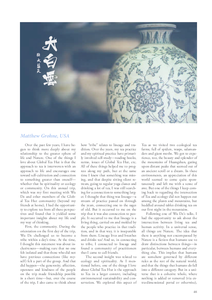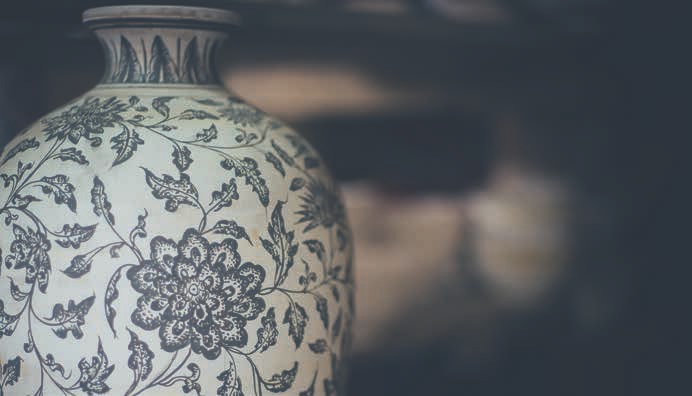
 |
|

Over the past few years, I have begun to think more deeply about my relationship to the greater sphere of life and Nature. One of the things I love about Global Tea Hut is that the approach to tea is interwoven with an approach to life and encourages one toward self-cultivation and connection to something greater than oneself - whether that be spirituality or ecology or community. On this annual trip, which was my first meeting with Wu De and other members of the Global Tea Hut community (beyond my friends at home), I had the opportunity to explore tea from all these perspectives and found that it yielded some important insights about my life and my way of thinking.
First, the community. During the orientation on the first day of the trip, Wu De challenged us to become a tribe within a day's time. At the time, I thought this statement was about inclusiveness - making sure that no one felt isolated and that those who did not have previous connections (like myself ) felt a part of the group. And that did happen - the generosity, affection, openness and kindness of the people on the trip made friendship possible in a short time - but, over the course of the trip, I also came to think about how "tribe" relates to lineage and tradition. Over the years, my tea practice and my spiritual practice have primarily involved self-study - reading books, sutras, issues of Global Tea Hut, etc. All of these things helped me to progress along my path, but at the same time I knew that something was missing, and that despite sitting silent retreats, going to regular yoga classes and drinking a lot of tea, I was still searching for a connection to something larger. I thought that thing was lineage - a stream of practice passed on through the years, connecting one to the sages of old. But it occurred to me on the trip that it was also connection to people. It occurred to me that lineage is a living thing, carried on and molded by the people who practice in that tradition, and in that way, it is inseparable from them. Lineage lives and breathes and drinks tea! And so, in connecting to tribe, I connected to lineage and found a community of practitioners that I came to call friends.
The second insight was related to ecology and spirituality. As I mentioned before, one of the things I love about Global Tea Hut is the approach to Tea in a larger context, including environmental sustainability and conservation. We explored this aspect of Tea as we visited two ecological tea farms, full of spiders, wasps, salamanders and giant moths. We got to experience, too, the beauty and splendor of the mountains of Huangshan, gazing upon distant peaks that seemed out of an ancient scroll or a dream. In these environments, an appreciation of this world seemed to come quite spontaneously and left me with a sense of awe. But one of the things I keep coming back to regarding the intersection of Tea and ecology did not happen out among the plants and mountains, but huddled around tables drinking tea on our first night in the mountains.
Following one of Wu De's talks, I had the opportunity to ask about the intersection between living tea and human activity. In a universal sense, all things are Nature. The idea that there is anything not encompassed by Nature is a fiction that humans use to draw distinctions between things - in particular, between humans and everything else. This implies that humans are somehow governed by different rules as the rest of the natural world, and that the things that humans do fall into a different category. But in a universe that is a cohesive whole, where nothing is added or removed (via extra-dimensional portal or otherwise), this is simply not the case. Humans are included in this whole, in Nature, as are all the things that humans do. As Wu De spoke about this, he used the example of a Zen garden, and how the changes made by the person tending the garden are as natural as a trail created by a rabbit or the grazing of a deer.
By extension, cities, cars, art and smartphones are part of Nature. So too are the use of chemical fertilizers, pesticides, and monoculture. Despite my tendency to think of human activity as separate from Nature, and to view this separate Nature in a more favorable light, in looking deeply I had to admit that human activity, too, (however much it alters the system) is included in Nature and operates by the same principles. There is no real, meaningful distinction - and this way of thinking only fosters a continued sense that I am different from Nature. But this leads to questions - In the context of the whole, how significant are the efforts we make toward things like sustainable farming and living tea? How does one reconcile the harm one sees being acted out around them with the knowledge that the whole of Nature is fundamentally complete and does not discriminate as we do? They were questions I had asked myself many times. Among other things, Wu De noted in his response that the co-existence of relative and absolute aspects of reality is a central paradox of the spiritual life. The key is to learn to maintain awareness of the absolute as we work in the relativity of our daily lives, and to recognize that we are living the resolution of these two aspects of existence. At some point words fail and there is only one thing to do: "Drink your tea!"
To live the spiritual life is to find space within dissonance, recognizing the completeness of the ecological whole even as we encounter the seeming imperfection and suffering of the world around us. One of the results of this space seems to be a gradual widening of identity to include things beyond just flesh and bone. Tea can be a wonderful way of remembering that fundamental connection to Nature and expanding the sense of self to include all of Existence. Seeing the farms, the farmers, the tea plants and the insects on the trip, all of which contributed to the cup of tea I now drink, was a reminder of this larger sphere. And with each silent session we shared as a community on the trip, I found myself appreciating the opportunity I had to remember this connection with something larger than my relative self.
